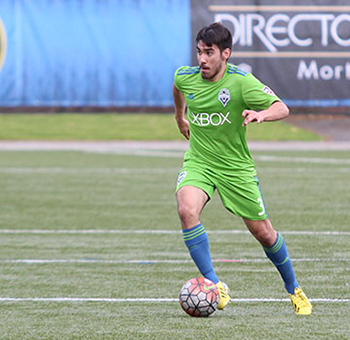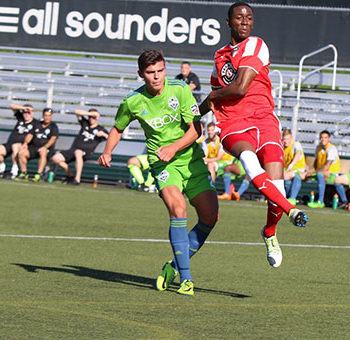
Five Mistakes a Soccer Player Can Make – Part 2
Part 2
They Blame External Things for the Way They Feel

Ask any of the PDL, USL, or MLS players I work with and they will agree that missing an easy pass, getting beat in a 1 vs 1 duel, not finishing an open look at goal, or their team’s results can affect how they feel. But guess what? Nothing outside of a player can affect how that player feels, unless they let it. The only thing that can affect your feelings is your own thinking in the moment. Consider the example of a player who is in a low negative mood who badly misses a pretty easy chance on goal. After the miss he may think “How did I miss that shot?!?” and continue to beat up on himself for the next few minutes. Beating up on himself could result in poor body language, lower energy levels, and a lack of ability to anticipate the next play. Which in turn could reduce his ability to show for a pass, or settle his touch correctly. If a player does not manage his emotions effectively, it might seem like missing the shot is making him feel angry or frustrated, which in turn is dragging his play down and messing with his game. In this case, he chose to blame the external thing of missing shot for how he feels and now his whole game is down the drain.
Now, let’s take a look at missing a shot from a different perspective; Let’s say you are having a great day and are feeling super confident about your play; everything is going really well for you on the field. At some point during the run of play you miss this same, relatively easy shot . . . do you react the same way to a missed shot when you’re having a great day? I bet you don’t. I bet you will probably say something like “That’s just one shot, no big deal, I’ll just get the ball again and put the next one away.” It’s not the circumstance, it’s 100 percent your thinking about the circumstance that matters as far as your play is concerned. When you take this approach, you are ready, even hungry, for the next opportunity!

Another example to consider; let’s say you play for an intense coach who generally seems angry when talking to the team before games. You are a player who plays your best when you feel a sense of creativity and joy on the field, so this angry coach is quite a challenge for you. This creativity and joy help fuel your hard work and ability to find space and be on the ball. But, as you listen to this angry coach spewing out lots of angry and negatively intense sounding things during his/her pre-game talk, you let those high negative emotions corrupt your sense of creativity and joy. Walking out to the field feeling angry yourself creates tight muscles and restricted movements for you. As a central mid your touch is now heavy and lacks fluidity. How well will you play now? My guess is you will go hard into your tackles but not be able to play with smooth and explosive movements while on the ball. The end result is you have let the anger from another person ruin your game.
Effective players understand the emotions that best fuel their game and make sure those emotions take the lead when they step on the field. Effective players understand that when a play doesn’t go their way, they quickly process how to fix it the next time and accept the challenge of immediately finding another ball so they can create a new positive play. Effective players control their emotions, don’t blame external things for how they feel, and work to put their focus right back onto the next play.
If you would like to learn more about which mental training tool helps athletes learn to control their emotions during practice and competition, message me or email [email protected] to find out more.
- sport in a pandemic: Crisis or opportunity?Chapter 4 - December 4, 2020
- Crafting the Perfect 10: - November 6, 2020
- Sport in a Pandemic:CRISIS OR OPPORTUNITY?Chapter 3 - September 23, 2020



1 Comment